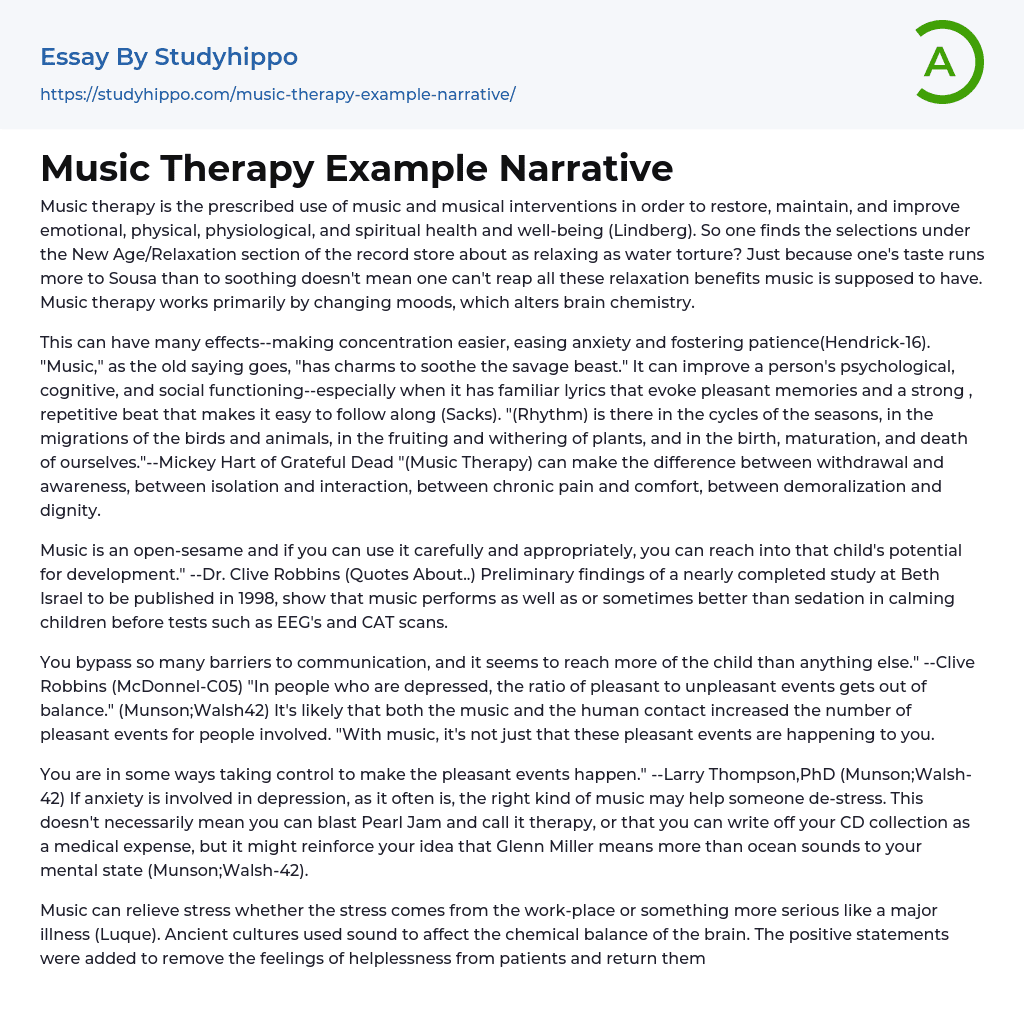Music therapy is the prescribed use of music and musical interventions in order to restore, maintain, and improve emotional, physical, physiological, and spiritual health and well-being (Lindberg). So one finds the selections under the New Age/Relaxation section of the record store about as relaxing as water torture? Just because one's taste runs more to Sousa than to soothing doesn't mean one can't reap all these relaxation benefits music is supposed to have. Music therapy works primarily by changing moods, which alters brain chemistry.
This can have many effects--making concentration easier, easing anxiety and fostering patience(Hendrick-16). "Music," as the old saying goes, "has charms to soothe the savage beast." It can improve a person's psychological, cognitive, and social functioning--especially when it has familiar lyrics that evoke pleasant memories and a stron
...g , repetitive beat that makes it easy to follow along (Sacks). "(Rhythm) is there in the cycles of the seasons, in the migrations of the birds and animals, in the fruiting and withering of plants, and in the birth, maturation, and death of ourselves."--Mickey Hart of Grateful Dead "(Music Therapy) can make the difference between withdrawal and awareness, between isolation and interaction, between chronic pain and comfort, between demoralization and dignity.
Music is an open-sesame and if you can use it carefully and appropriately, you can reach into that child's potential for development." --Dr. Clive Robbins (Quotes About..) Preliminary findings of a nearly completed study at Beth Israel to be published in 1998, show that music performs as well as or sometimes better than sedation in calming children before tests such as EEG's and CAT scans.
You bypass so many barriers to communication, and it seem
to reach more of the child than anything else." --Clive Robbins (McDonnel-C05) "In people who are depressed, the ratio of pleasant to unpleasant events gets out of balance." (Munson;Walsh42) It's likely that both the music and the human contact increased the number of pleasant events for people involved. "With music, it's not just that these pleasant events are happening to you.
You are in some ways taking control to make the pleasant events happen." --Larry Thompson,PhD (Munson;Walsh-42) If anxiety is involved in depression, as it often is, the right kind of music may help someone de-stress. This doesn't necessarily mean you can blast Pearl Jam and call it therapy, or that you can write off your CD collection as a medical expense, but it might reinforce your idea that Glenn Miller means more than ocean sounds to your mental state (Munson;Walsh-42).
Music can relieve stress whether the stress comes from the work-place or something more serious like a major illness (Luque). Ancient cultures used sound to affect the chemical balance of the brain. The positive statements were added to remove the feelings of helplessness from patients and return them to a sense of control.
"(It might) not neccesarily cure them, but it can change things. It might not be quantity for extending life, but it is quality in enjoying life more. The brain is impacted by what it perceives. What we are trying to do is change the negative to a positive, and it all translates into physiology. It's more than just sounding mystical, a fantasy.
There's medical reality. There is real potential for healing in music, imagery, and positive affirmations."--Dr. Lee S. Berk (Luque) It's hard
for many mental patients to put their frustrations into words, but music therapy lets them communicate their feelings freely through the expression of enjoyment of music (Lindberg, B.).
The music helps underscore the message (Hendrick-16). The order, harmony, and beauty of music seizes our imaginations and emotions and contrasts with the chaos of everyday life. "While physical movement is choked with the starts and stops and stumbles, music establishes a continuous flow, and does it in perfect proportions." --Robert Jourdain (McDonnell). "Patients can benefit from using music therapy as an active, creative, expression of their personality.
" --Rachel McCaffrey (Lindberg). "Music is an excellent therapy because is meets with little or no intellectual resistance and does not need to appeal to logic." --Dr. Ira Altchuler (Koch-19). Scientists believe that different kinds of music interact with the brain to release certain mood-altering chemicals.
This explains "why music appears to ease some physical symptoms--like the pain associated with surgery, childbirth and cancer--and ameliorates some cases of high blood pressure, gastric disorders and migraine headaches." --Nancy Butcher "Their response to music is amazing; people who can hardly move suddenly move vigorously to the sound of music." --Connie Tomain, music therapist at Beth Abraham Hospital (Marvin,23). Music is definitely more than just notes on a page. Anyone can listen to music, but if one doesn't learn how to feel music, they're really missing out. Music provides a communication tool that enables one to state what they are unable to voice.
- Sonnet essays
- Concert essays
- Piano essays
- Hip Hop essays
- Music Reference essays
- Musical Instruments essays
- Mp3 essays
- Recording essays
- Music video essays
- Singing essays
- Song essays
- Tupac shakur essays
- Classical Music essays
- Opera essays
- Rock Music essays
- Blues essays
- Jazz essays
- Sonata essays
- Baroque Music essays
- Rock And Roll essays
- Ludwig Van Beethoven essays
- Michael Jackson essays
- Popular music essays
- Band essays
- Classical Concert essays
- Music Concert Report essays
- Music Awards essays
- Walk This Way essays
- Song Analysis essays
- Actors essays
- Celebrity essays
- Magic essays
- Media essays
- Movies essays
- Music essays
- Roller coaster essays
- Television essays
- Video Game essays




